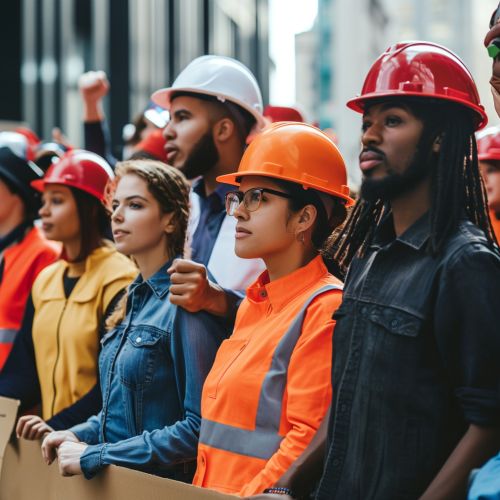Workers' Rights
Introduction
Workers' rights pertain to the legal and human rights relating to labor relations between workers and employers. These rights are codified in national and international labor and employment law. In general, these rights' debates have to do with negotiating workers' individual and collective rights pertaining to their employment. Through these rights, workers seek to improve their working conditions and ensure their well-being in the workplace.
History
The history of workers' rights is a story of labor struggles, societal changes, and evolving legal standards. The early labor movement was primarily focused on fighting for basic rights such as safe working conditions, fair wages, and the right to form trade unions. The Industrial Revolution in the 19th century brought about significant changes in the nature of work, leading to the establishment of labor laws that recognized workers' rights.
Legal Framework
Workers' rights are protected by a variety of laws and regulations at both the national and international level. These laws cover a wide range of issues, including minimum wage, working hours, health and safety, and the right to join a union. Internationally, the International Labour Organization (ILO) sets labor standards that member countries are expected to adhere to.
Types of Workers' Rights
There are numerous types of workers' rights, including but not limited to:
Right to Safe Working Conditions
Workers have the right to a safe and healthy work environment. This includes the right to be free from harmful substances, hazardous conditions, and physical and mental abuse.
Right to Fair Wages
Workers have the right to receive fair compensation for their work. This includes the right to a minimum wage and equal pay for equal work.
Right to Freedom of Association
Workers have the right to form and join trade unions. This includes the right to collective bargaining and the right to strike.
Right to Non-Discrimination
Workers have the right to be free from discrimination in the workplace. This includes the right to equal opportunity and treatment regardless of race, color, sex, religion, political opinion, national extraction, or social origin.
Challenges and Issues
Despite the legal protections in place, workers' rights continue to face numerous challenges. These include the rise of precarious employment, the erosion of labor standards, and the increasing power of multinational corporations. Furthermore, certain groups of workers, such as migrant workers and informal workers, often fall through the cracks of labor protection.
Future of Workers' Rights
The future of workers' rights is uncertain and will likely be shaped by a variety of factors, including technological advancements, economic changes, and political developments. However, the fundamental principles of workers' rights - such as the right to fair wages, safe working conditions, and freedom of association - will likely remain at the heart of labor debates.


